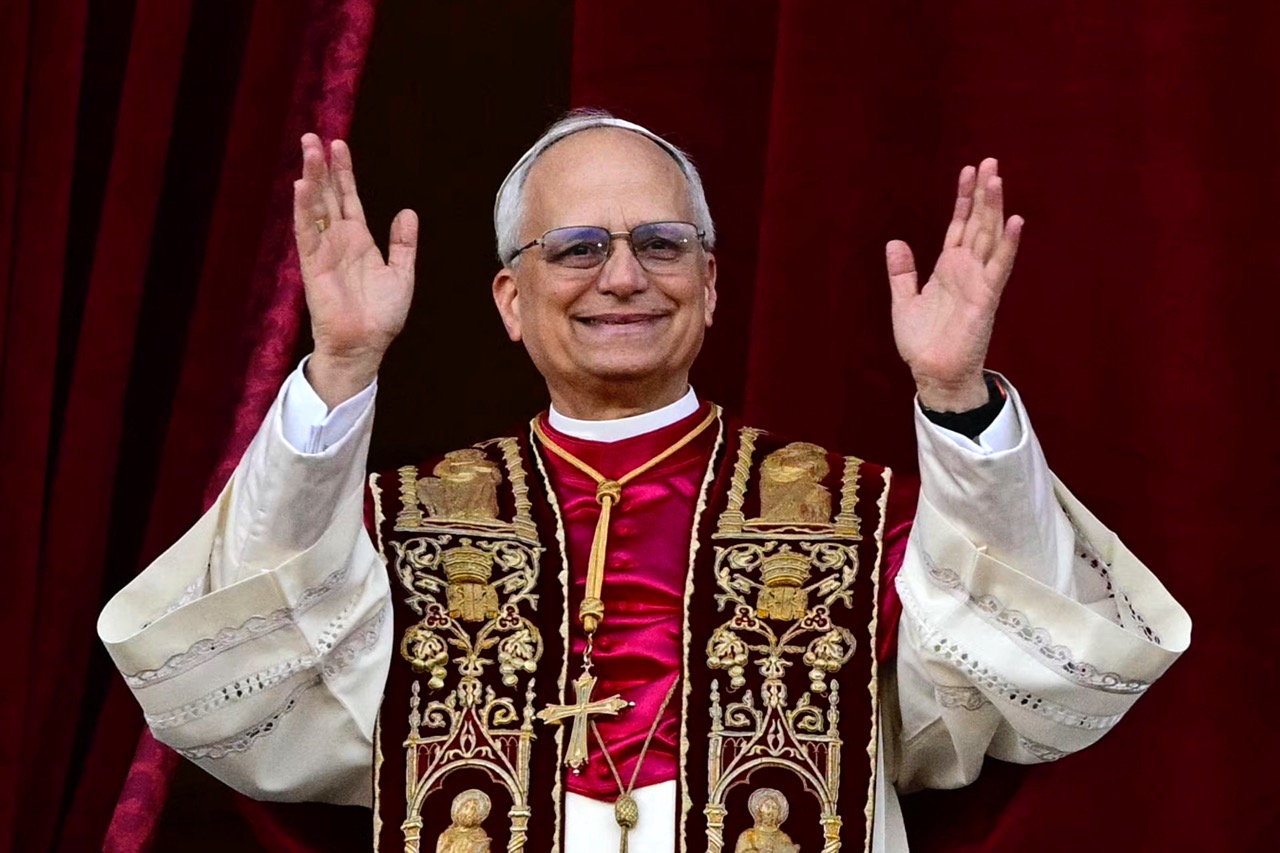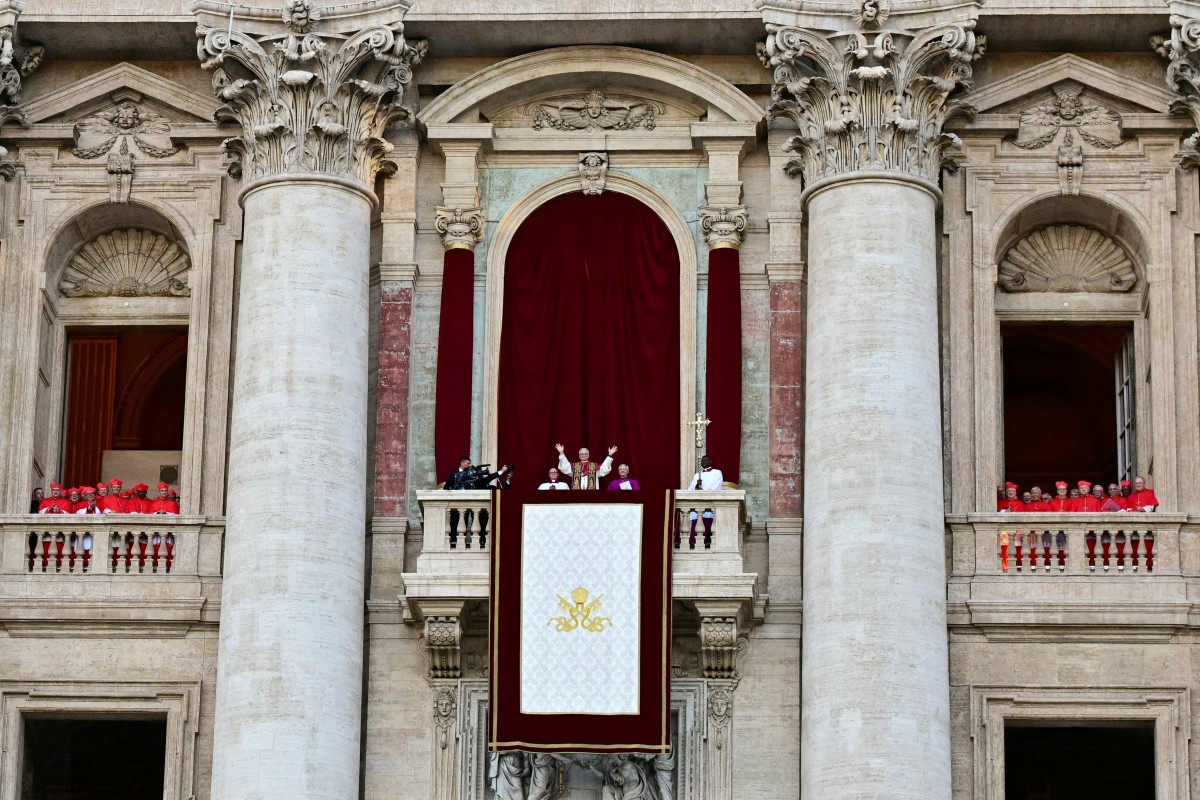
By Agence France-Presse
Robert Francis Prevost became Pope Leo XIV on Thursday after cardinals from around the globe chose him to be the overall leader of the world’s 1.4 billion Catholics from the United States.
Tens of thousands cheered as Leo, successor to the late Pope Francis, appeared on the balcony of Saint Peter’s Basilica to deliver his first address.
“To all people, wherever they are, to all peoples, to the whole Earth, peace be with you,” the smiling 69-year-old Chicago native told the crowd.
“Help us, and each other, to build bridges through dialogue, through encounter, to come together as one people, always in peace,” the new Pontiff added.
Leo’s speech drew warm applause, especially a section where the prelate—who spent more than two decades in Peru—broke into Spanish, and also when he paid tribute to the popular Francis.
“We still keep in our ears that weak, but always courageous, voice of Pope Francis blessing Rome,” he said, referring to his predecessor’s Easter Sunday address, which would turn out to be that pontiff’s last.
“We must seek together how to be a missionary Church, a Church that builds bridges, which holds dialogues, which is always open,” Leo said.
‘Great honor’
Prevost’s election was greeted with elation in Peru, where he was bishop in the northern city of Chiclayo and had acquired nationality, as well as the United States.
Outside Saint Patrick’s Cathedral in New York, 66-year-old Rosaria Vigorito said she could “feel the excitement just in the few minutes I’ve been walking around.” She hoped Leo XIV would be a reformer who would allow women priests.
“He loved goat, duck with rice, and ceviche. Those were his favorite dishes,” Chiclayo’s current Bishop Edison Farfan told a press conference, highlighting the new Pope’s deep links to the South American nation.
Prevost had been talked about as among the “papabili”—cardinals thought qualified for the papacy—and as someone who could defend and further Francis’ legacy.
But he was not a globally recognized figure among the Catholic rank and file.
World leaders raced to welcome the 267th pope and promised to work with the Church on global issues at a time of geopolitical uncertainty.
Leo now faces a momentous task. Aside from asserting his moral voice on a conflict-torn world stage, he must try to unite a divided Church and tackle burning issues such as the continued fall-out from the sexual abuse scandal.
As Cardinal Prevost, the new Pope had defended the poor and underprivileged and had reposted articles online critical of US President Donald Trump’s anti-migrant policies.
But the White House nevertheless welcomed the election. “Congratulations to Cardinal Robert Francis Prevost, who was just named pope,” Trump said in a social media post.
“It is such an honor to realize that he is the first American Pope. What excitement, and what a Great Honor for our Country,” the US President added.
It was not known how many ballots it took to elect Leo XIV, but the conclave followed recent history in wrapping up in less than two days.
While the details of the election will remain secret for a long time, conclave rules required the new Pope to secure at least two-thirds of votes to be elected.

‘Amazing’
The crowds swelled with emotion when white smoke billowed into the sky from the Sistine Chapel chimney, signaling an election on the second day of voting.
The bells of Saint Peter’s Basilica and churches across Rome rang out and crowds rushed toward the Square to watch the basilica balcony, fitted out with red curtains for the first address from the new Pope, who was introduced in Latin.
“It’s an amazing feeling,” said Joseph Brian, a 39-year-old chef from Belfast in Northern Ireland, who came with his mother to Rome for the spectacle.
“I’m not an overly religious person, but being here with all these people just blew me away,” he told Agence France-Presse (AFP) as people around him jumped in excitement.
‘Habemus Papam’
“Habemus Papam, woooo!” howled 41-year-old Bruna Hodara from Brazil, echoing the words to be spoken on the balcony as the new Pope is introduced.
She, like others, recorded the historic moment on her phone, as others waved flags and cried out “Viva Il Papa!” or “Long live the pope!” in Italian.
The papal inauguration usually takes place less than a week after the election, with a Mass celebrated before political and religious leaders from around the world.
Ahead of that, Leo XIV will lead a Mass Friday for cardinals in the Sistine Chapel and recite the Regina Caeli prayer in Saint Peter’s Square on Sunday.
He will hold an audience for the media on Monday.
Vatican spokesman Matteo Bruni told journalists Prevost’s choice of papal name was “a clear reference to the social doctrine of the Church.”
Leo XIII, who was pope at the end of the 19th century, was a determined defender of the rights of workers.
Francis died aged 88 after a 12-year papacy—during which he sought to forge a more compassionate Church.
While he provoked anger from conservatives with his progressive approach, there had been many Catholics calling for a successor in his vein.
Some 80% of the cardinals who voted for Prevost were appointed by Francis.
With electors hailing from 70 countries, it was the most international conclave ever.
